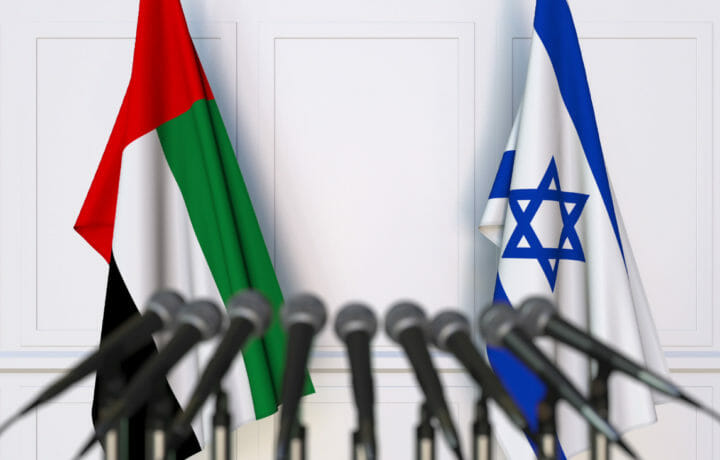Can common enemies create strange bedfellows? Even though publicly unstated, concerns over Iran’s nuclear capabilities are opening nonexistent diplomatic channels between Israel and other middle eastern countries.
On Monday, Israeli Prime Minister (PM) Naftali Bennett, the first Israeli PM to openly visit the Gulf state, met with United Arab Emirates’ (UAE) leader Crown Prince of Abu Dhabi Sheikh Mohammed bin Zayed Al Nahyan. This landmark meeting was conceived to deepen ties between the two countries as a follow on to the Abraham Accords.
Abraham Accords
Last year, the State of Israel, the UAE, and the U.S., signed a joint statement, known as the Abraham Accords. The high-level meeting was attended by the Emirati Foreign Minister Abdullah bin Zayed Al Nahyan, the Bahraini Foreign Minister Abdullatif bin Rashid Al Zayani, Israeli Prime Minister Benjamin Netanyahu, and U.S. President Trump on September 15, 2020, in Washington. The accords are named after Abraham to emphasize the shared origin of belief between Judaism and Islam, both of which are Abrahamic religions, strictly embracing the monotheistic worship of the God of Abraham.
The Abraham Accord marked the first public normalization of relations between an Arab country and Israel since the peace treaty brokered in 1994 between Jordan and Israel. Over the past year, Israel and the UAE have continued to enhance the brokered Abraham Accords ties. Unknown to most, a covert rapport between Israel and the UAE has been underway for nearly 10 years. Now it appears their relationship is beginning to prosper.
Monday’s meeting with PM Bennett and Sheikh Mohamed demonstrates a symbolic historic change in the countries’ affairs. They reviewed the current state of the bilateral cooperation and ways to develop investments, economics, and trade in such areas such as agriculture, renewable energy, health, and advanced technology. These are all elaborations from the Abraham Accords Peace Agreement framework.
Israel’s View on the Meeting
Prime Minister Bennett is the first Israeli leader to visit the UAE. His predecessor Benjamin Netanyahu made several attempts to visit, but all were thwarted, due to COVID-19 restrictions and multiple elections.
However, PM Bennett’s meeting looks to have been a success. He stressed the importance of the relationship between Israel and the UAE, stating his wish is for, “mutual partnership and friendship.” Before the meeting, Bennett told the Emirati Press, “We are neighbors and cousins. We are the grandchildren of Prophet Abraham.” Bennett called relations between the Israel and the UAE, “a precious treasure for us and the entire region” and that the countries are working for a better future.
“I expect that our relations will remain good, especially in the economic field. In my opinion, cooperation in the field of health and food security will constitute a major part of the cooperation,” Bennett stated. “Our cooperation provides unprecedented economic opportunities not only for us, but for more countries, which is another element for enhancing stability and prosperity in this region.”
The Emirati Benefits
The Emirati leader, Sheikh Mohamed, told WAM, the official news agency of the UAE, that the meeting with Bennett will, “advance the relationship of cooperation towards more positive steps in the interests of the people of the two nations and of the region.” Highlighting his desire to boost bilateral cooperation and joint action to enhance mutual interests, Sheikh Mohamed stated the UAE’s foreign relations are based on principles of mutual respect and cooperation, upholding the values of peace and coexistence; hoping stability prevails in the Middle East.
The Nuclear Elephant in the Room
The BBC are reporting even with PM Bennett’s desire to boost economic and commercial ties, both Israel and the UAE view Iran’s nuclear program as a major threat. The topic likely was discussed with PM Bennett expected to have urged the UAE to take a tougher stance in response to Iran’s expanding nuclear program. The UAE shares Israel’s concerns about the potential threat from a nuclear-armed Iran but is also trying to establish better relations with Tehran. Publicly, Sheikh Mohamed stated he hoped the meeting would contribute to the consolidation of stability, security, and development in the region.




